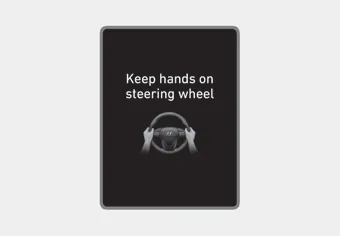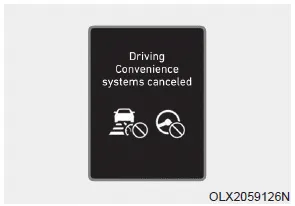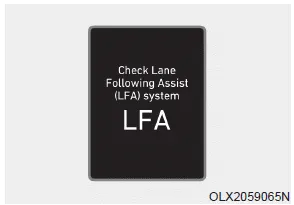Hyundai Palisade (LX2): Lane Following Assist (LFA) system / Warning Message

Keep hands on steering wheel
If the driver takes their hands off the steering wheel for several seconds while the LFA system is activated, the system will warn the driver.
Information
Hold the steering wheel tight. Otherwise, the LFA system could misjudge that the driver's hands are off the steering wheel, and the above warning may occur.
WARNING
The warning message may appear late according to road conditions. Therefore, always have your hands on the steering wheel while driving.

Driving Convenience systems canceled
If the driver still does not have their hands on the steering wheel after the message "Keep hands on steering wheel", the system will not control the steering wheel and warn the driver only when the driver crosses the lane markers.
However, if the driver has their hands on the steering wheel again, the system will start controlling the steering wheel.
WARNING
- The LFA system is a supplemental system only. It is the responsibility of the driver to safely steer the vehicle and to maintain it in its lane.
- Turn off the LFA system and
drive without using the system
in the following situations:
- In bad weather
- In bad road conditions
- When the steering wheel needs to be controlled by the driver frequently.
- When towing a vehicle or trailer
Information
- Even though the steering is assisted by the system, the driver may control the steering wheel.
- The steering wheel may feel heavier when the steering wheel is assisted by the system than when it is not.

Check Lane Following Assist (LFA) system
If there is a problem with the system a message will appear for a few seconds. If the problem continues, we recommend that you have the vehicle inspected by an authorized HYUNDAI dealer.
The LFA system will not be in the ENABLED state and/or the steering wheel will not be assisted when:
- The turn signal is turned on before changing a lane. If you change lanes without the turn signal on, the steering wheel might be controlled.
- The vehicle is not driven in the middle of the lane when the system is turned on or right after changing a lane.
- ESC (Electronic Stability Control) or VSM (Vehicle Stability Management) is activated.
- The vehicle is driven on a sharp curve.
- Vehicle speed is over 95 mph (153 km/h).
- The vehicle makes sharp lane changes.
- The vehicle brakes suddenly.
- Only one lane marker is detected.
- The lane is very wide or narrow.
- There are more than two lane markers on the road (e.g. construction area).
- Radius of a curve is too small.
- The vehicle is driven on a steep incline.
- The steering wheel is turned suddenly.
- The system may not operate for 15 seconds after the engine is started or the camera is initialized.
System setting With the ignition switch in the ON position, the Lane Following Assist can be activated by selecting 'User settings → Driver Assistance → Driving Assist → Lane Following Assist' in the cluster LCD display.
The LFA system may operate prematurely even if the vehicle does not depart from the intended lane, OR, the LFA system may not assist your steering or warn you if the vehicle leaves the intended lane under the following circumstances: When the lane and road conditions are poor It is difficult to distinguish the lane marking from the road surface or the lane marking is faded or not clearly marked.
Categories
- Manuals Home
- Hyundai Palisade Owners Manual
- Hyundai Palisade Service Manual
- General Tightening Torque Table
- Emergency liftgate safety release
- Body Electrical System
- New on site
- Most important about car
